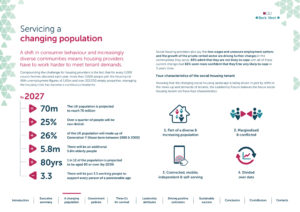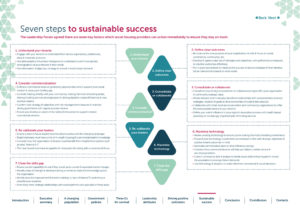
94% of social housing providers demand improved government housing policy, according to ‘The Changing Landscape for Social Housing’ report from Civica, which reveals housing providers’ concerns and their call for changes to better support them and the communities they serve.
Independent research across 100 senior decision makers in social housing providers found that:
94% believe the Government needs to improve its housing policy, with the current policy leaving them and the communities they serve at risk.
- 65% want central housing policy to focus on a broader range of tenures beyond home ownership and 49% want to see the annual 1% rent cut reduced or scrapped entirely.
- They will be prioritising the safeguarding of jobs (59%), cutting costs and driving efficiencies (57%), improving customer service and satisfaction (57%) and dealing with changing regulations and reforms (52%) over the next 12 months.
- Technology will play a vital role in achieving these objectives with 50% planning to use digital services to transform and modernise customer services and to unlock significant savings.
- Board members and senior leaders need to improve their risk (41%) and change management (41%), governance (38%) and strategy and development (37%) skills to drive transformation.
 Civica, a provider of critical software applications, digital solutions and outsourcing services that help organisations transform the way they work, launched The Changing Landscape for Social Housing report, in partnership with SOLACE and The Chartered Institute of Housing (CIH). The report was developed in light of the increasing challenge housing organisations face during a period of significant social, financial and service challenges.
Civica, a provider of critical software applications, digital solutions and outsourcing services that help organisations transform the way they work, launched The Changing Landscape for Social Housing report, in partnership with SOLACE and The Chartered Institute of Housing (CIH). The report was developed in light of the increasing challenge housing organisations face during a period of significant social, financial and service challenges.
Terrie Alafat, chief executive, Chartered Institute of Housing, explained: “The current policy and political environment is a pivotal time for social housing providers. This report looks to bring providers of all shapes and sizes together so as a profession we can respond and remain in charge of our own destiny. Housing organisations must join forces to establish a new working relationship with the government.”
The report was developed using insights from a roundtable discussion between local authority and housing association leaders, and research which questioned another 100 senior housing decision makers from organisations across England. The report draws attention to the struggles organisations face with current housing policy.
It also details that in light of these challenges, over the next 12 months social housing providers will be prioritising dealing with changing regulations and reforms (52%), safeguarding jobs (59%), cutting costs and driving efficiencies (57%) and improving customer service and satisfaction (57%). It also highlights the key factors impacting the social housing landscape, identifies key characteristics of the changing tenant and provides guidance for housing organisations to successfully navigate this myriad of market pressures and thrive.
Technology is widely expected to play an increasingly vital role in achieving these objectives with 50% of social housing providers planning to use digital technology and automation to transform and modernise services and to unlock significant savings. Organisations are prioritising flexible working supported by mobile devices (59%), automated communications & process workflows (57%) and outsourcing aspects of the business to relevant IT experts (48%).
The report also urges social housing leaders to prioritise the use of digital technology and automation alongside traditional channels to go beyond channel shift, and to invest in connected devices and data management to improve tenant engagement, increase efficiencies and extend preventative measures, with support from key partners.
Lindsay Simons, director of corporate services, South Lakes Housing commented: “Our strategy is to maximise the delivery of new homes and we need to focus on improving efficiency and reducing costs to achieve that. We’re taking a long-term approach, making significant investments in technology and collaborating creatively with other housing providers in our region to deliver savings through economies of scale. The relaxation of rent controls would be a welcome step towards enabling providers to more effectively manage their businesses and deliver their new homes strategies.”
 The report explains that to survive, the social housing industry must drive significant transformation within the next 12-18 months. In order to achieve this, board members and senior leaders will need to improve their risk (41%) and change management (41%), governance (38%) and strategy and development (37%) skills. It will also be crucial for leaders to develop a culture of change and innovation including a more commercialised focus, and a more flexible workforce who are not only able to cope with these adjustments but also help drive forward progress to create the best possible outcomes for tenants. Many social housing providers are already commercialising their services to create additional revenues.
The report explains that to survive, the social housing industry must drive significant transformation within the next 12-18 months. In order to achieve this, board members and senior leaders will need to improve their risk (41%) and change management (41%), governance (38%) and strategy and development (37%) skills. It will also be crucial for leaders to develop a culture of change and innovation including a more commercialised focus, and a more flexible workforce who are not only able to cope with these adjustments but also help drive forward progress to create the best possible outcomes for tenants. Many social housing providers are already commercialising their services to create additional revenues.
Paul Bradbury, executive director of business development, Civica, concluded: “The pace of change and expectation is increasing, including rapid advances in technology and the greater availability of data for a 24/7 on-demand public. The ability to confidently navigate this changing landscape and to harness innovation is what will set apart those who thrive. Navigation is made significantly easier with the right skills, strong leadership, supportive partnerships, detailed data and efficient processes.”
The Changing Landscape for Social Housing report outlines three strategies for survival, leadership attributes to ensure success, how technology is driving positive outcomes in the community; as well as seven steps to sustainable success. It is the fifth instalment in Civica’s Changing Landscape report series.








